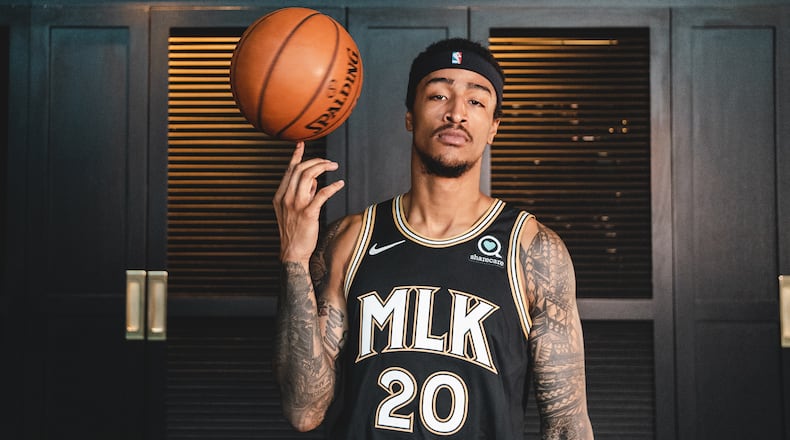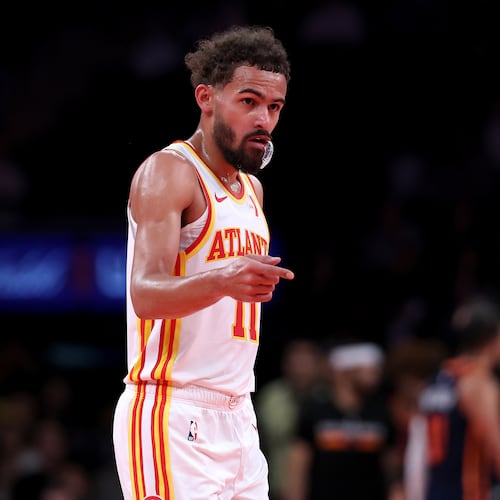The Dec. 21 deadline for the Hawks and John Collins’ camp to get a deal done for an extension is fast approaching, and both sides are still hopeful that can happen, according to people familiar with the situation.
That deadline arrives Monday, the day before the 2020-21 regular season officially begins. Although both sides have been aiming to get something done before the deadline, it’s unclear if they’ll be able to reach an agreement that makes sense for both sides in time.
If nothing is settled by the deadline, Collins still has one year left on his contract with the Hawks. He previously said he’d like to avoid entering a “contract year,” but that would happen as a result, and after next season Collins would become a restricted free agent. He and the Hawks could still work out a deal at that time, though other teams would be able to extend offers to Collins, as well, with the Hawks able to match or decline.
In May, Collins told the AJC that he feels he should be in the conversation for a max deal, and expressed the desire to get something done sooner rather than later: “When we’re talking max numbers and money, I feel like I definitely (am in) the conversation to have earned that money with the Hawks specifically, but obviously I know there’s business, and we don’t always get exactly what we want,” Collins said. “But I want to be a Hawk. I want to stay with the Hawks.”
“I feel like we’ve both invested ourselves in each other. … I feel like we both want to see our investments in each other pay off. In that sense, I just want to know where I am. I want to know I’m locked in as soon as I can rather than having to wait, which I know happens, but when you do wait, a lot of other stuff mentally creeps in during the season while I’m tired, while I’m playing, ups and downs, injuries, but that’s also a part of just being a pro athlete.”
Collins, who the Hawks drafted at No. 19 in 2017, has been one of the team’s core young pieces since his arrival and is now the longest-tenured player on the team at age 23. He has grown into a skilled offensive player and was one of five in the NBA to average a 20-plus point and 10-plus rebound double-double last season, with 21.6 points and 10.1 rebounds. The other four players: Milwaukee’s Giannis Antetokounmpo (29.6 points, 13.7 rebounds), Philadelphia’s Joel Embiid (23.4 points, 11.8 rebounds), Minnesota’s Karl-Anthony Towns (26.5 points, 10.8 rebounds) and Denver’s Nikola Jokic (20.2 points, 10.2 rebounds).
He also led the Hawks in 3-point shooting last season (40.1%). One of the biggest questions surrounding Collins is his defensive ability and if he can improve enough in that area. He did take a step forward last season, and was more active with 1.6 blocks per game compared with 0.6 the season before, but coach Lloyd Pierce is looking for Collins to become more physical in Year 4.
The Hawks view Collins as a power forward, though he can play center, as well. Questions about his future with the franchise were raised when the Hawks added players who potentially overlap in power forward Danilo Gallinari and rookie center Onyeka Okongwu, who likely will be able to play some at the 4 eventually, as well.
However, it should be noted Collins is nine years younger than Gallinari, who hasn’t reached the 70-game mark in a single season since tearing his ACL in 2013. And although Okongwu may be able to play power forward in the future, Collins is a much more proven and established player there.
The Hawks may choose to let things play out and see how Collins produces when on a more talented roster and surrounded by guys who will compete for playing time. They also would get a chance to see how Collins fits with the rest of the frontcourt in Gallinari, Okongwu and Clint Capela. While there’s not a huge downside to this, they’d be taking a calculated risk. If Collins has a stellar season and increases his value, teams could make him a big offer that would be difficult for the Hawks to match.
As impressive as Collins’ numbers were last season, he did so in a smaller sample size (41 games). He was suspended for 25 games for violating the NBA’s drug policy and the Hawks’ season was cut 15 games short because of the pandemic. The year before that, he played in 61 games, missing time with an ankle injury. He played in 74 games as a rookie, but started only 24.
As far as national recognition goes, Collins tends to be underrated. Some of that may be the result of the Hawks rebuilding for three years and just now having expectations to win and get back into the playoffs. But Collins thinks not playing a full season yet contributes to that and is hoping to stay healthy and available for the full 72-game season this season, which has been shortened as the NBA calendar shifted.
“I always end up saying, whether it being my rookie year, not playing as many games as I should have with the new coaching and whatnot, and then my injury and my suspension, I feel like every year, it’s always been something, you know what I mean?” Collins said.
“I’ve never had a full (82-game) season, and I honestly think that’s what it is, personally. But as we know, basketball is more than just basketball on the court, as well, it’s a bunch of different things, politics and whatnot.
“But I honestly just think it’s my lack of having a full season under my belt and being able to just prove myself night in and night out. Knock on wood, I’m praying that everything goes swell and smoothly in all areas and aspects for this year, and I can complete that.”
Regardless of what happens, Collins will play another season in Atlanta, and his goals for the season are pretty simple: “To be an All-Star, to lead my team to the playoffs, to win, at minimum, and I feel like that’s for every one of our guys.”
About the Author
Keep Reading
The Latest
Featured


